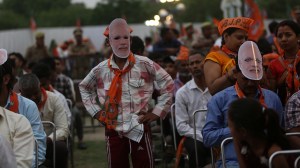- India
- International
Same old rent-seeking
Politicians yearn to lay hands on Karnataka’s public goods and natural assets, control its bureaucracy. The present political crisis is a reflection of this impulse.
 Of late, Karnataka politics, which has had a colourful “chicken-eating Brahmin” CM, has become better known for the chief minister who was jailed on corruption charges. (Illustration by Suvajit Dey)
Of late, Karnataka politics, which has had a colourful “chicken-eating Brahmin” CM, has become better known for the chief minister who was jailed on corruption charges. (Illustration by Suvajit Dey)
For the first time in many years, Karnataka may break with its long-established norm of having a state government that is not formed by the same party that holds office at the Centre. Many exemplary traditions forged in this state usually went unnoticed — until the “discovery of Karnataka” during the 2018 election. How far we have travelled from the exceptional leadership of a Devaraj Urs, arguably the most important non-communist Indian leader committed to land reforms and social welfare, or an Abdul Nazir (“Neer”/water) saab, who pioneered an exemplary water policy in the 1980s! Karnataka should also have been better known for its decentralisation of panchayati raj institutions and its reservations for women long before the nation picked up those leads. And it was none other than the current Speaker, K R Ramesh Kumar, who as health minister in 2017, attempted to tame the rapacious private health establishment in Karnataka.
All these legacies have now been overshadowed by the spectacle of renegade JD(S) and Congress MLAs. As we watched them sprint down the corridors of Vidhana Soudha, exemplarily secured from public anger, desperate JD(S)/Congress “poachers”, the media, and assorted “threats” to their precious life and limbs, they looked nothing like the “rebels” they believe they are. So, what new political norms are being fashioned in Karnataka?
We are yet to establish whether the “green corridor” the renegades were ensured through the city of Bengaluru on the way from the HAL airport to the Vidhana Soudha — infuriating evening commuters — is a national first. Or is it A H Vishwanath, who has redefined hypocrisy, since he had once said, in his book Mallige Maatu published in 2014, that all justifications for “deserting the natal home and sheltering with the enemy” are like smokescreens of renegades looking for “fresh pastures to graze on”?
Of late, Karnataka politics, which has had a colourful “chicken-eating Brahmin” CM, has become better known for the chief minister who was jailed on corruption charges. Even the CM’s RSS background did not steel him from the fatal attractions of land and mining contracts. And the restless ambitions of the party he had forsaken in 2012 once more restored him to the place of chief manoeuvrer.
But he is not alone in his preoccupations. Even a cursory glance at the backgrounds and assets of the deserters provided in The Indian Express is revealing: Apart from Shivaram Hebbar, whose declared assets have mysteriously declined between 2013 and 2018, and A H Vishwanath, whose crores remained stable in the same period, most other legislators, such as B Ramalinga Reddy, Roshan Baig, Ramesh Jharkiholi, Anand Singh, S T Somasekhar, Byrathi Basavaraj, N Munirathna, K Gopalaiah have massively upped their incomes. M T B Nagaraj has declared himself the richest real-estate-businessman-turned-politician with assets of a dizzying Rs 1,015 crore.

Forget agriculture, neither the IT/BT or the garment industries, for which Bengaluru may be better known, nor even the once lucrative education sectors are sending their representatives to the legislative bodies. The wealth of those legislators on the “run” is drawn from two important areas — strip mining and real estate. Neither of these are guaranteed to swell government coffers, offer jobs or bring well-being to the people of Karnataka. The catastrophic devastation of Bellary or Chitradurga, with possibly irreversible consequences for soil and water, is no longer discussed, though the 2011 Lokayukta report detailed the colossal loss to the exchequer, damage to the environment, and severely declining village welfare from illegal iron mining and forest encroachment in the Bellary area.
Bengaluru has been the honey pot for real estate interests since at least the 1980s, when the kith and kin of successive chief ministers quite unpatriotically declared “oore nammadu” (this state/land is ours). Anthropologists such as Michael Goldmann have coined the term “speculative urbanism” to describe the “unnatural” market processes by which urban growth, particularly on the peripheries of the city, follows speculation, determining not only acquisitions and sales but also urban form.
This has not stopped the renegades from claiming they want to serve the people. Dismayed by the election of Louis Napolean Bonaparte in 1851, Karl Marx had insightfully suggested that we get beyond the deceptive “self perceptions” of quarrelling political factions. Memorably, he noted: “Thus the Tories in England long imagined that they were enthusiastic about monarchy, the church, and the beauties of the old English Constitution, until the day of danger wrung from them the confession that they are enthusiastic only about ground rent.”
These individual biographies establish that politicians yearn to lay hands on the state’s public goods and natural assets, as well as control of its once independent bureaucracy. The result is often the disaster that the current resort/hotel politics completely eclipsed. It was the collapse of a building under construction in one of Bengaluru’s cosmopolitan areas, Pulakeshinagar (formerly Cox Town), which killed five people. It was a textbook case of the violations that are tolerated by civic inspectors, bureaucrats, and politicians — three floors built in the place of two, which led to the collapse of an adjoining basement, and a domino effect which threatened a third building as well.
Bengaluru’s passage from a small town to a big metropolis was enabled by such illegalities, involving variously the state, builders, the middle-class and even the urban poor. In this building collapse, several destinies intersected: Poor construction labourers (including two from Bengal) in their search of a livelihood paid with their lives; some middle-class investors, though fully complicit in the illegalities, lost their homes; we are yet to see what will happen to the bureaucrats, civic officials and builders linked to the chain of illegalities.
But our legislator profile strongly suggests that as a class, builders and their partners in government will survive unscathed, with or without “divine intervention”. Inscribed on the auspiciously east facing entrance of the Vidhana Soudha are the words, “Government Work is God’s Work”. Karnataka’s legislators have breathed new life into those words. Worship is work: H D Revanna while at Chamundi claimed that the current government was divinely ordained. In non-theological terms, such pre-ordination refers to the desire for sovereign power.
During the Karnataka elections of 2018, then Karnataka chief minister, Siddaramaiah, refused the path that many, including his own party chief, had taken by their craven tours of temples and mathas. He had stressed instead the humanism of Basava’s message, a uniquely Karnataka heritage, that had spurned caste at its founding. Now he too is twitching with more earthly ambition.
It is too early to tell whether the hypernationalist “alternative” raised by the new kid on the block, Tejasvi Surya, will refocus Karnataka’s “unity” around the project of identifying second-class citizens. At this time, it is urgent to recall what Karnataka’s recent history has taught us: That perhaps only consensually agreed on constraints on certain economic “freedoms” (for example, unrestrained mining) and political practices (for instance, the penchant for unleashing a reign of terror rather than abiding by a rule of law) will enable a morally defensible social life, and ensure true freedom, equality, the flourishing of the human condition and what we owe to others, not least those generations to come.
EXPRESS OPINION
Apr 24: Latest News
- 01
- 02
- 03
- 04
- 05










































